Sociocultural Aspects of Development
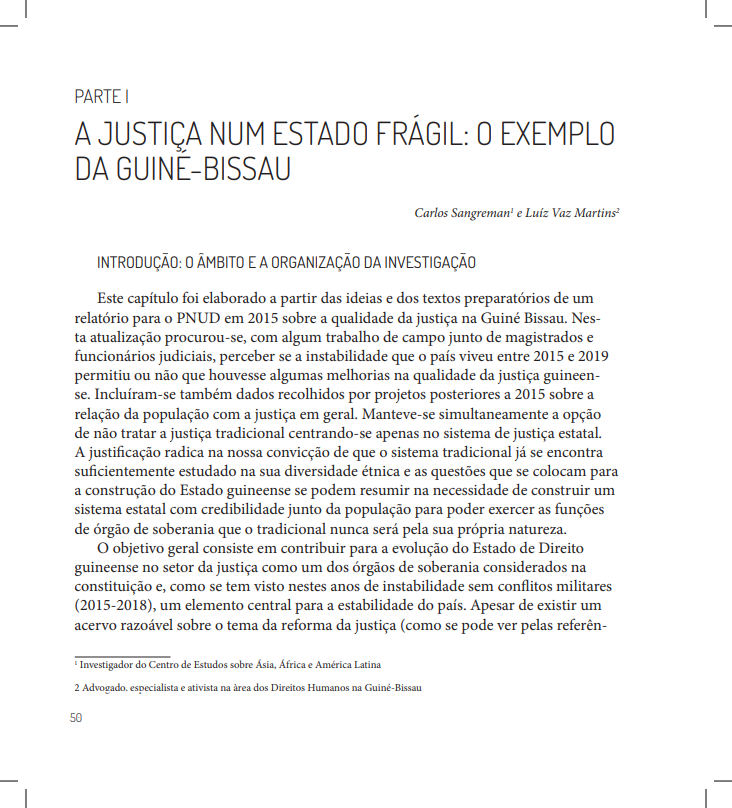
Qualidade da Justiça na Guiné-Bissau. Avaliação e recomendações.
Abstract:
The debate on justice is fundamental to understanding the conditions for the realisation of fundamental rights. The reflection on justice and human rights in Guinea-Bissau, which permeates the project “Cooperation in the Promotion of Human Rights: the case of Justice in Guinea-Bissau in the Rights Observatory”, promoted by ACEP and CEsA and funded by Camões-ICL, is part of the work of both organisations with the Guinean League of Human Rights in the Rights Observatory. Since 2015, this Observatory has been collecting and analysing data, throughout the territory of Guinea-Bissau, on the realisation of social and economic rights, and the reflection on justice represents a contribution to stimulating debate and knowledge on one of the most important monitoring areas for the country’s development. Furthermore, ACEP participated, as an associated organisation, in a project of the Guinean Human Rights League on impunity in Guinea-Bissau, and researchers from CEsA have carried out research and published articles on justice, the State and international cooperation in this country. Qualidade da Justiça na Guiné-Bissau. Avaliação e recomendações was prepared based on the ideas and preparatory texts of a report for UNDP in 2015 on the quality of justice in Guinea-Bissau. This update sought, through some fieldwork with magistrates and judicial officials, to understand whether or not the instability that the country experienced between 2015 and 2019 allowed for some improvements in the quality of justice in Guinea-Bissau. It also included data collected by projects after 2015 on the population’s relationship with justice in general. At the same time, the option of not dealing with traditional justice was maintained, focusing only on the state justice system.
Quotation:
Sangreman, Carlos e Luis Vaz Martins (2019). “Qualidade da Justiça na Guiné-Bissau. Avaliação e recomendações”.In Justiça e direitos humanos na Guiné-Bissau, Debates e Perspetivas. ISBN 978-989-8625-18-2, 2019, ACEP e CESA, Lisboa.
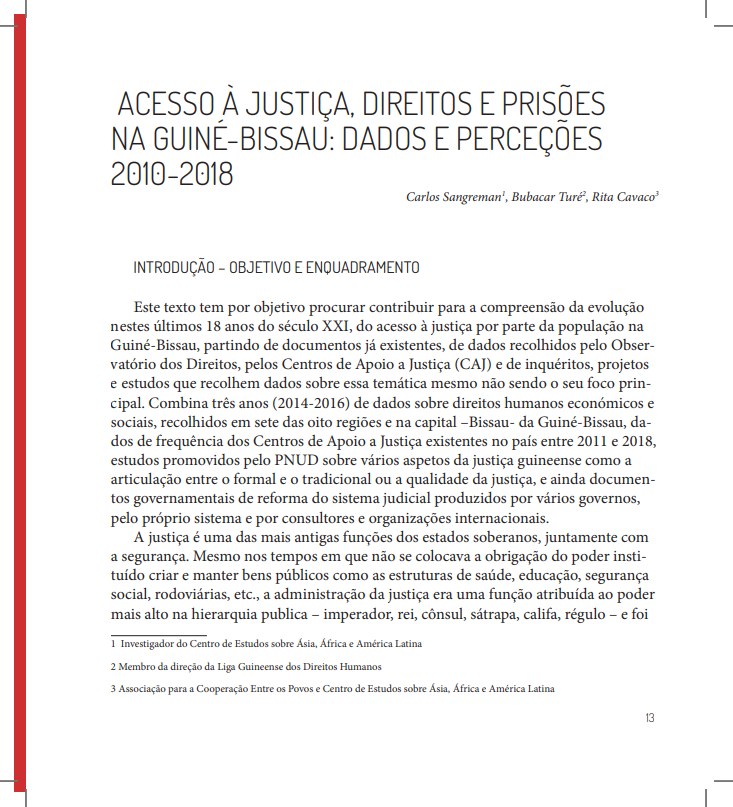
Acesso a Justiça, Direitos e Prisões na Guiné – Bissau. Dados e Perceções 2010-2018
Abstract:
The debate on justice is fundamental to understanding the conditions for the realisation of fundamental rights. The reflection on justice and human rights in Guinea-Bissau, which permeates the project “Cooperation in the Promotion of Human Rights: the case of Justice in Guinea-Bissau in the Rights Observatory”, promoted by ACEP and CEsA and funded by Camões-ICL, is part of the work of both organisations with the Guinean League of Human Rights in the Rights Observatory. Since 2015, this Observatory has been collecting and analysing data, throughout the territory of Guinea-Bissau, on the realisation of social and economic rights, and the reflection on justice represents a contribution to stimulating debate and knowledge on one of the most important monitoring areas for the country’s development. Furthermore, ACEP participated, as an associated organisation, in a project of the Guinean Human Rights League on impunity in Guinea-Bissau, and researchers from CEsA have carried out research and published articles on justice, the state and international cooperation in this country. Acesso a Justiça, Direitos e Prisões na Guiné – Bissau. Dados e Perceções 2010-2018 aims to contribute to the understanding of the evolution of access to justice by the population in Guinea-Bissau over the last 18 years of the 21st century, based on existing documents, data collected by the Observatory of Rights, the Justice Support Centres (CAJ) and surveys, projects and studies that collect data on this theme even though it is not their main focus.
Quotation:
Sangreman, Carlos, Bubacar Turé e Rita Cavaco (2019). “Acesso a Justiça, Direitos e Prisões na Guiné – Bissau. Dados e Perceções 2010-2018”.in Justiça e direitos humanos na Guiné-Bissau, Debates e Perspetivas. ISBN 978-989-8625-18-2, 2019, ACEP e CESA, Lisboa.
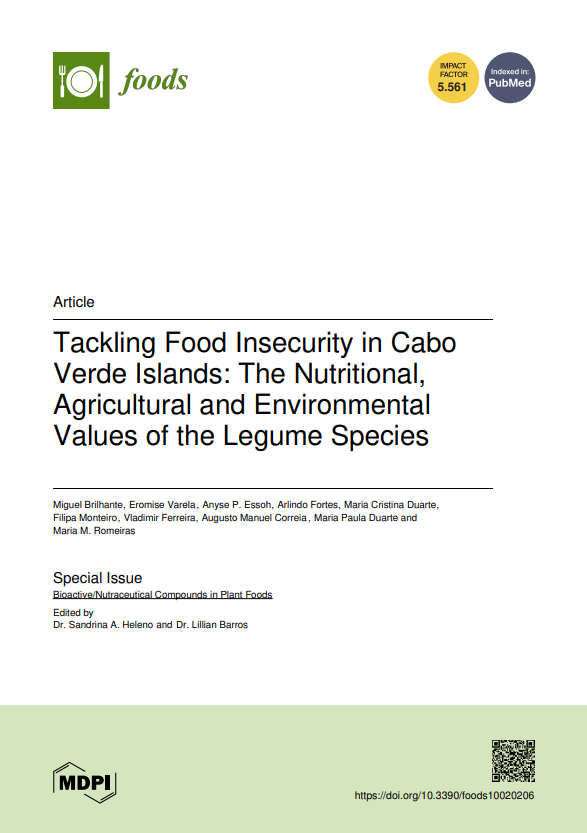
Tackling Food Insecurity in Cabo Verde Islands: The Nutritional, Agricultural and Environmental Values of the Legume Species
Abstract:
Legume species are important food sources to reduce hunger and deal with malnutrition; they also play a crucial role in sustainable agriculture in the tropical dry islands of Cabo Verde. To improve the knowledge of the heritage of plant genetic resources in this Middle Income Country, Tackling food insecurity in Cabo Verde Islands: the nutritional, agricultural and environmental values of the legume species had three main goals: (i) to provide a checklist of food legumes; (ii) to investigate which species are traded in local markets and, based on field surveys, to compare species for their chemical, phenolic, antioxidant, and nutritional composition; and (iii) to discuss the agronomic value and contribution to food security in this archipelago. Our results revealed that 15 species are used as food and 5 of them are locally traded (Cajanus cajan, Lablab purpureus, Phaseolus lunatus, Phaseolus vulgaris, and Vigna unguiculata). The role of these species as sources of important minerals, antioxidants, and nutritional components for food security is highlighted, and the native ones (Lablab purpureus and Vigna unguiculata) stand-out as particularly well-adapted to the climate of these islands, which are already experiencing the adverse effects of climate change. We conclude that the sustainable use of these genetic resources can contribute to the reduction of hunger and poverty, thus meeting some challenges of the Sustainable Development Goals.
Quotation:
Brilhante, M., Varela, E., Essoh, A.P, Fortes, A., Maria Cristina Duarte, M.C., Monteiro, F., Ferreira, V., Correia, A. M., Duarte, M.P; Romeiras, M. M (2021). Tackling food insecurity in Cabo Verde Islands: the nutritional, agricultural and environmental values of the legume species. Nutrients, 13. MDPI. Pag. 17. https://www.mdpi.com/2304-8158/10/2/206
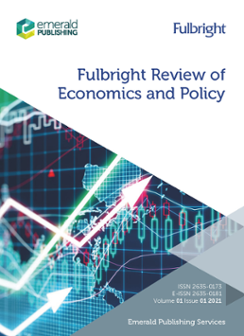
Common causes in grassroot development: a case for community-based and community-driven response in the postpandemic era
Abstract:
The purpose of Common causes in grassroot development: a case for community-based and community-driven response in the postpandemic era is to determine the impact of community-based and driven approaches during the lockdowns and early periods of the pandemic. The study examines the impact and perceptions of the state-led intervention. This would help to discover a better approach for postpandemic interventions and policy responses. This article used the inductive method and gathered its data from surveys. In search of global opinions on COVID-19 responses received in communities, two countries in each continent with high COVID-19 infection per 100,000 during the peak period were chosen for study. In total, 13 community workers, leaders and members per continent were sampled. The simple percentile method was chosen for analysis. The simple interpretation was used to discuss the results. The study showed that poor publicity of community-based interventions affected awareness and fame as most were mistaken for government interventions. The study found that most respondents preferred state interventions but preferred many communities or local assessments of projects and interventions while the projects were ongoing to adjust the project and intervention as they progressed. However, many preferred community-based and driven interventions.
Quotation:
Patrick-Agulonye, U.V. (2021). “Common causes in grassroot development: a case for community-based and community-driven response in the postpandemic era” Fulbright Review of Economics and Policy, Vol. 1 No. 2, pp. 186-204. https://doi.org/10.1108/FREP-09-2021-0056

State of the Art About COVID-19’s Impact on Santiago University, Cape Verde
Abstract:
The COVID-19 pandemic has become a critical challenge for the higher education sector worldwide. Under such a circumstance, the exploration of the capacity of this sector to adapt to such a state of uncertainty has become of huge importance. In this chapter, State of the art about COVID-19 impact in Santiago University – Cape Verde, the authors critically reflect on the Cape Verdean teaching experience during the early COVID-19 lockdown. This is an exploratory case study based on a qualitative approach with an aim to reflect on new practices of teaching under a pandemic emergency. Based on the teaching experience of teaching in Santiago University, they explain how this university has changed from a face-to-face to an online teaching system and stress the challenges and opportunities that appear from this transition process. This chapter concludes that this strategy has become an opportunity to the university since it consistently raised the number of international students cooperating with them and also that the more adaptive and resilient approaches to online teaching were also a success.
Quotation:
Sarmento, E., Monteiro, J. (2021). Capítulo 16: State of the art about COVID-19 impact in Santiago University – Cape Verde. In Loureiro, Sandra & Guerreiro, João (eds.) Handbook of Research on Developing a Post-Pandemic Paradigm for Virtual Technologies in Higher Education. ISBN13: 9781799869634; ISBN10: 1799869636. IGI Global (Q2, SJR:0,338)
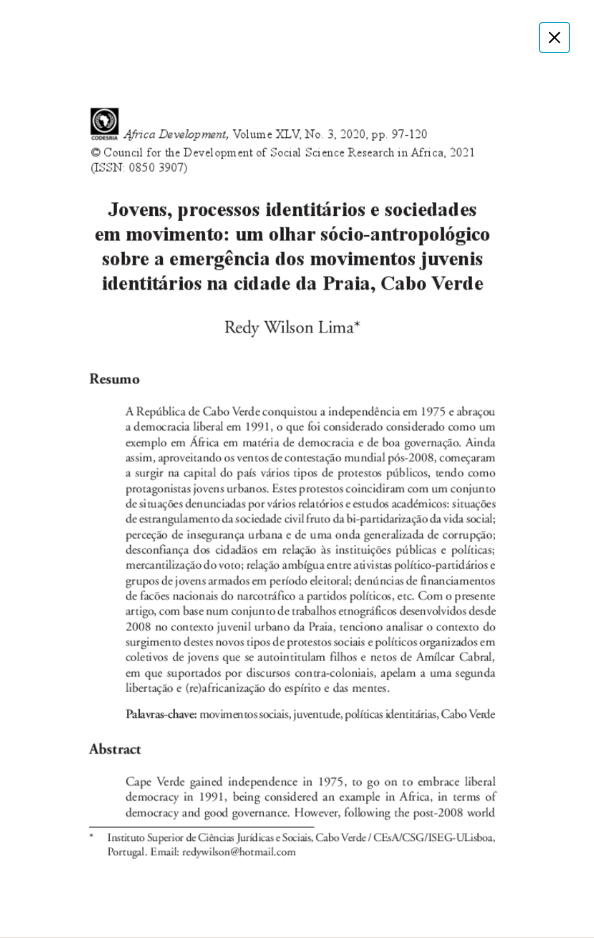
Jovens, processos identitários e sociedades em movimento
Abstract:
The Republic of Cape Verde gained independence in 1975 and embraced liberal democracy in 1991, which was regarded as an example in Africa of democracy and good governance. Still, taking advantage of the post-2008 global winds of protest, various types of public protests began to emerge in the country’s capital, with urban youth as the main protagonists. These protests coincided with a set of situations denounced by various reports and academic studies: situations of strangulation of civil society resulting from the bi-partisanship of social life; perception of urban insecurity and a generalized wave of corruption; citizens’ distrust of public and political institutions; commercialization of the vote; ambiguous relationship between political party activists and armed youth groups during elections; accusations of funding of political parties by national drug trafficking factions, etc. Jovens, processos identitários e sociedades em movimento: um olhar alternativo sobre os movimentos sociais urbanos emergentes na cidade da Praia – Cabo Verde, based on a set of ethnographic works developed since 2008 in the urban youth context of Praia, intends to analyse the context of the emergence of these new types of social and political protests organized in youth groups who call themselves sons and grandsons of Amílcar Cabral, supported by counter-colonial discourses, calling for a second liberation and (re)Africanization of the spirit and minds.
Quotation:
Lima, R.W. (2020). “Jovens, processos identitários e sociedades em movimento: um olhar alternativo sobre os movimentos sociais urbanos emergentes na cidade da Praia – Cabo Verde”. In: Jesus, L.S.B.; Barros, M.; Filice, R.C.G. (Orgs.), Tecendo redes antirracistas II: contracolonização e soberania intelectual. Fortaleza: Imprensa Universitária, p. 116-136.
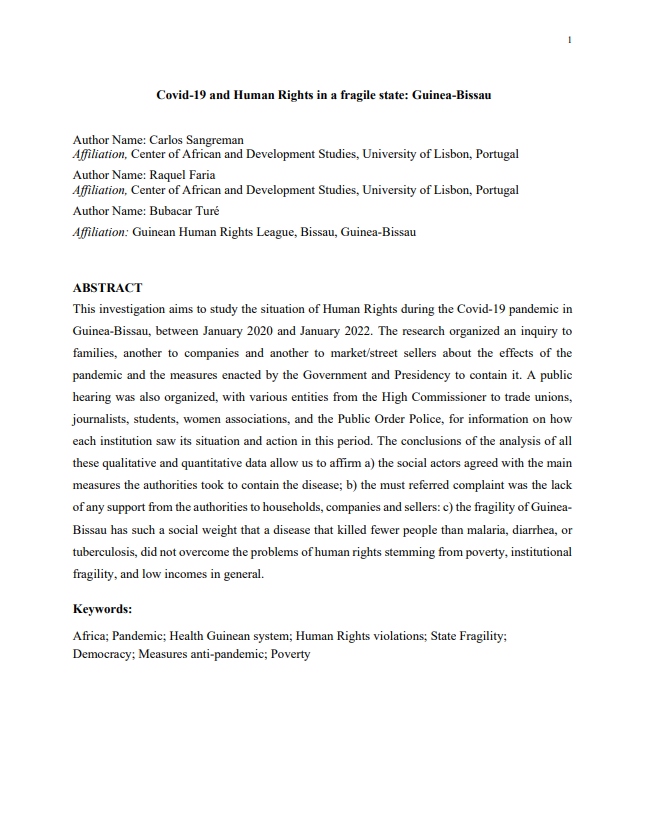
Covid-19 and Human Rights in a fragile state : Guinea-Bissau
Abstract:
COVID-19 and Human Rights in a Fragile State: Guinea-Bissau aims to study the situation of Human Rights during the Covid-19 pandemic in Guinea-Bissau, between January 2020 and January 2022. The research organized an inquiry to families, another to companies and another to market/street sellers about the effects of the pandemic and the measures enacted by the Government and Presidency to contain it. A public hearing was also organized, with various entities from the High Commissioner to trade unions, journalists, students, women associations, and the Public Order Police, for information on how each institution saw its situation and action in this period. The conclusions of the analysis of all these qualitative and quantitative data allow us to affirm a) the social actors agreed with the main measures the authorities took to contain the disease; b) the must referred complaint was the lack of any support from the authorities to households, companies and sellers: c) the fragility of Guinea-Bissau has such a social weight that a disease that killed fewer people than malaria, diarrhea, or tuberculosis, did not overcome the problems of human rights stemming from poverty, institutional fragility, and low incomes in general.
Quotation:
Sangreman, C., Faria, R. T., & Turé, B. (2022). COVID-19 and Human Rights in a Fragile State: Guinea-Bissau. In P. Andrade, & M. Martins (Ed.), Handbook of Research on Urban Tourism, Viral Society, and the Impact of the COVID-19 Pandemic (pp. 341-360). IGI Global. https://doi.org/10.4018/978-1-6684-3369-0.ch018
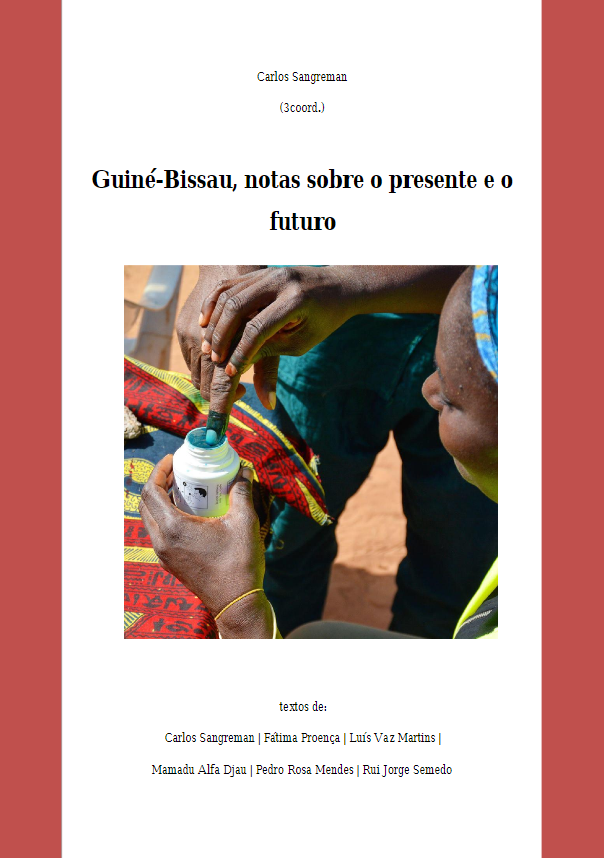
Guiné-Bissau – Notas sobre o presente e o futuro
Abstract:
The idea of publishing the book Notas sobre o presente e o futuro of Guinea-Bissau arose from the need to get to know the country better and to think about its recent past, which will inevitably contribute to its near future. The aim was to collect existing texts that were revised and updated and to ask some authors to reflect on themes based on the motto “Guinea-Bissau, notes on the present and the future”. These texts are published at a special moment in the country. After a period of a government appointed by the military that took power in 2012, elections were held in 2014 and a round table was held in Brussels where the country received a great deal of encouragement from its international partners – institutions and countries – in support of a government and a president that everyone had hoped would provide a more stable and successful evolution such as there had not been until then. But these expectations came up against a conflict between sovereign bodies, which frustrated this support and threw the country into a four-year period of instability that began to end with the legislative elections on 10 March 2019 but is only expected to return to normal institutional functioning with the presidential elections in November of the same year.
Quotation:
Sangreman, Carlos, Fátima Proença, Luís Vaz Martins, Mamadu Alfa Djau, Pedro Rosa Mendes e Rui Jorge Semedo Guiné-Bissau – Notas sobre o presente e o futuro, com, ISBN 978-989-20-9932-3, CESA-ISEG/ULisboa, 2019, Lisboa.
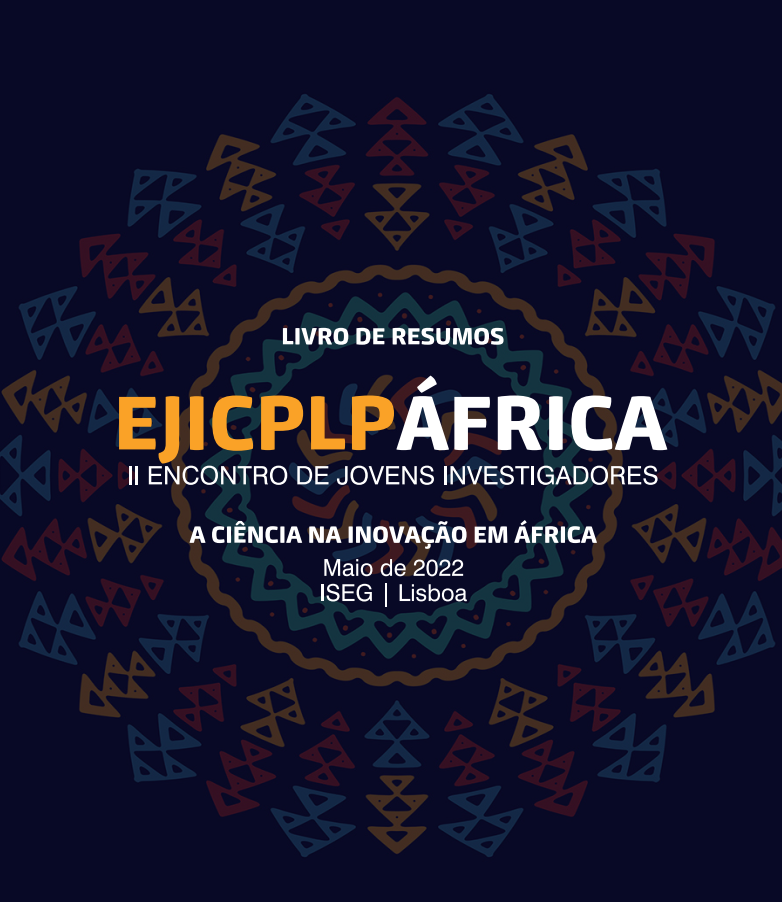
Ebook – EJICPLP Africa: Science in Innovation in Africa
Abstract:
The Meeting of Young Researchers from CPLP on Africa is an inclusive space for debate and scientific dissemination in African studies and in Portuguese language, in an innovative, democratic and multicultural perspective. The success of this project began in 2021, when it was proposed to bring participation and protagonism to young people, as agents of change in a living community in permanent transformation. In this context, the 2nd Meeting was held in May 2022, in Lisbon, where the role of science in innovation in Africa was discussed, exceeding all expectations, whether in the quality of the debates, the excellence and diversity of the works presented, or the massive adhesion of the participants. The Meeting took place thanks to the work carried out by the Organising Committee, an International Scientific Council, with the collaboration of the Centre for African and Development Studies (CEsA), as the proponent entity. in addition to the support of other partner institutions, such as the CPLP, Lisbon City Council (CML), Higher Institute of Economics and Management (ISEG), Catholic University of Angola (UCAN), Union of Portuguese Speaking Capital Cities (UCCLA), Eduardo Mondlane University (UEM – Mozambique), Association of Municipalities for Sustainable Development of the Umbria Region (FELCOS – Italy). The 2º Encontro de Jovens Investigadores da CPLP sobre África – Livro de Resumos was only possible thanks to the collaboration of numerous people, in particular the Organizing Committee, the Scientific Council, the Speakers, the Institutional Partners, the Medias Partners, the Volunteers and the Scientific Community.
Quotation:
D’Abril, Cristina Molares [et al.] (2022). “2º Encontro de Jovens Investigadores da CPLP sobre África. Livro de Resumos”. ISBN: 978-989-54687-3-7
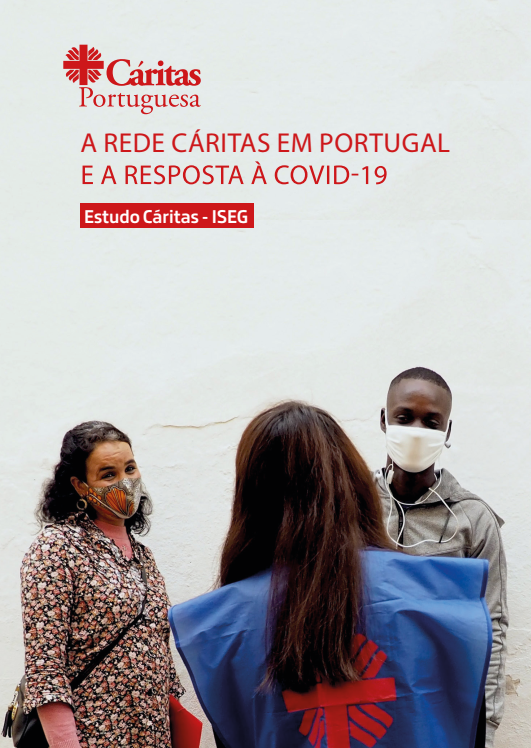
A Rede Cáritas em Portugal e a Resposta à Covid-19
Resumo:
A Rede Cáritas em Portugal e a Resposta à Covid-19 analyzes the importance of the social action of the Cáritas Network in Portugal in an unexpected and health emergency context, by documenting the organization’s response to the Covid-19 pandemic. An analysis is made of the continuity actions, but also of the innovations that emerged during the first year of the pandemic. With a presence that covers all the districts of Mainland Portugal and Islands, the Cáritas Network in Portugal developed, for the first time, a National Program of direct support to families in the form of goods and food stamps, as well as occasional and urgent financial support intended for payment of basic needs such as rent, health and electricity expenses, to a considerable number of beneficiaries (10,444 people, 3,205 families). The study shows that the Cáritas Network in Portugal was able to continue the food support activities and occasional support that it was already developing, given a greater demand from families: 60% of people who sought support from Cáritas in this period had never resorted to this kind of help.
Citação:
Pais Bernardo, Luís, Ana Luísa Silva, Renata Vieira de Assis e Luís Mah (Coord.). 2021. “A Rede Cáritas em Portugal e a Resposta à Covid-19”. Estudo Cáritas / CEsA-ISEG. Lisboa: Cáritas Portuguesa. Agosto.





